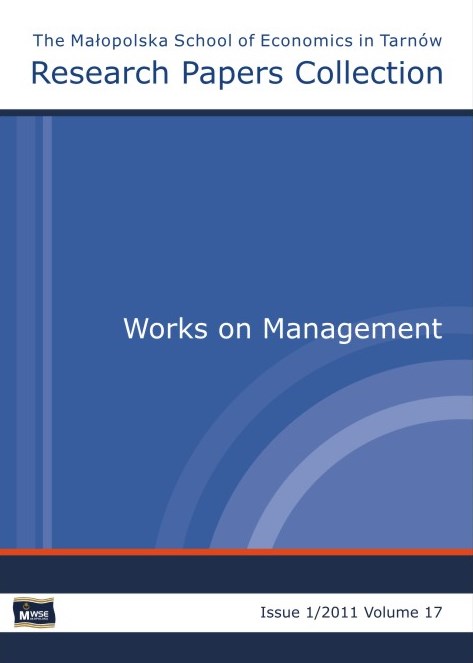Abstract
The author defines the terms of innovation, innovativeness and innovative attitudes in the paper. The text is based on three basic theses. First, due to the fact that the capacity to create innovation is an issue gaining more and more importance and it is becoming a function in the process of company management. Innovative attitude is a source of innovation, however, knowledge subjected to the proper processing is the necessary condition. Perception of the entity through its employees, and they in turn being assessed in terms of the acquired skills and inborn predispositions, is the guarantee of success in business activities and in developing the innovative potential. Every single entity is capable of being innovative, only the proper activities to stimulate creativity and creative thinking should be undertaken. This role may be successfully performed by any university-level educational facility, and the enterprise would continue the initiated process of developing and perfecting innovative attitudes. Additionally, the paper presents trends in the changes that occur in university-level education and the role that universities perform in the economy based on knowledge. The enterprising university may be a place to gain knowledge and learn being innovative. Creativity and innovativeness of the student is developed there, and when he completes his studies, he will become a prospective employer or employee. The essence of developing the above features and assuming such attitudes has been presented, because this may contribute to an organisation being innovative, thus its achieving permanent competitive edge and further dynamic growth. Additionally, combining science with business is one of the possibilities of propagating pro-innovative patterns in the economy. Emphasising the role of a university-level educational facility is a chance for making changes in education and in business at the same time. Finally, the author presents conclusions from the presented problem.
References
Białoń L. (red.), Zarządzanie działalnością innowacyjną, Wydawnictwo Placet, Warszawa 2010. ISBN 978-83-7488-153-1.
View in Google Scholar
Cichocki T., Kołodziejski M., Zakładanie i funkcjonowanie spółek odpryskowych (typu spin-off i spin-out). W: M. Besler (red.), Własność intelektualna i komercjalizacja wiedzy na uczelni, Instytut Gospodarki WSIiZ w Rzeszowie, Rzeszów 2009. ISBN 978-83-60583-43-2.
View in Google Scholar
Diagnoza stanu szkolnictwa wyższego w Polsce, [online], Ernst & Young Business Advisory, Instytut Badań nad Gospodarką Rynkową, 2009. Dostępny w Internecie: http://www.nauka.gov.pl/fileadmin/user_upload/Finansowanie/fundusze_europejskie/PO_KL/Projekty_systemowe/20100727_Diagnoza_stanu_SW.pdf (dostęp: 5.03.2011).
View in Google Scholar
Drozdowski R. i in., Wspieranie postaw proinnowacyjnych przez wzmacnianie kreatywności jednostki, Wydawnictwo Polskiej Agencji Rozwoju Przedsiębiorczości, Warszawa 2010. ISBN 978-83-931515-0-9.
View in Google Scholar
Kozioł L., System innowacyjności współczesnych przedsiębiorstw, „Zeszyty Naukowe Małopolskiej Wyższej Szkoły Ekonomicznej w Tarnowie” 2009, nr 1 (12).
View in Google Scholar
Kurtyka M., Roth G., Zarządzanie zmianą. Od strategii do działania, Wydawnictwo CeDeWu, Warszawa 2009. ISBN 978-83-60089-80-4.
View in Google Scholar
Matusiak K., Budowa powiązań nauki z biznesem w gospodarce opartej na wiedzy. Rola i miejsce uniwersytetu w procesach innowacyjnych, Oficyna Wydawnicza Szkoły Głównej Handlowej, Warszawa 2010. ISBN 978-83-7378-514-4.
View in Google Scholar
Mączyńska E. (red.), Meandry upadłości przedsiębiorstw. Klęska czy druga szansa?, Oficyna Wydawnicza Szkoły Głównej Handlowej, Warszawa 2010. ISBN 978-83-7378-487-1.
View in Google Scholar
Podręcznik Oslo. Zasady gromadzenia i interpretacji danych dotyczących innowacji, Publikacja OECD i Eurostatu, Wyd. 3, Ministerstwo Nauki i Szkolnictwa Wyższego, Departament Strategii i Rozwoju Nauki, Warszawa 2008. ISBN 978-83-61100-13-3.
View in Google Scholar
Stabryła A. (red.), Doskonalenie struktur organizacyjnych przedsiębiorstw w gospodarce opartej na wiedzy, Wydawnictwo C.H. Beck, Warszawa 2009. ISBN 978-83-255-0237-9.
View in Google Scholar
© Copyright by Małopolska School of Economics in Tarnów. The articles are available under the Creative Commons Attribution NonCommercial-NoDerivatives 4.0 International License


